From August 16th to August 20th, 2021, the International workshop on Gödel's Incompleteness theorems hosted by the School of Philosophy of Wuhan University was successfully held online. The incompleteness theorems published by Gödel in 1931 profoundly impacted the fields of logic, philosophy, mathematics, theoretical computer science, etc. The motivation of this workshop is to celebrate the 90th anniversary of the publication of Gödel's incompleteness theorems, and promote communications on the latest research on Gödel's Incompleteness theorems.
There are 24 talks and ten sessions of this workshop, with three generations of international scholars from 13 countries. Speakers include internationally renowned logicians and philosophers such as Saul Aaron Kripke (Academician of the American Academy of Arts and Sciences), Lev D. Beklemishev (Academician of the Russian Academy of Sciences), and Wilfried Sieg (American Academy of Arts and Sciences Academician), Harvey Friedman (Distinguished Professor of Mathematics, Philosophy, and Computer Science at Ohio State University), Michael Rathjen, (Professor in Department of Mathematics, University of Leeds), Julia F. Knight (Professor in Department of Mathematics, University of Notre Dame) and Matthias Baaz (Professor in Department of Mathematics, Vienna University of Technology) etc. The organizers include Prof. Yong Cheng (School of Philosophy at Wuhan University), Prof. Albert Visser (Royal Netherlands Academy of Arts and Sciences), Prof. Andreas Weiermann (Department of Mathematics at Ghent University, Belgium), and Prof. Yue Yang (Department of Mathematics at the National University of Singapore).
At 3 pm on August 16th, Qizhu Tang(Vice President of Wuhan University), Dianlai Li (Dean of the School of Philosophy of Wuhan University), Professor Matthias Baaz (Executive Vice Chairman of the Kurt Gödel Society), and Professor Albert Visser (Academician of the Royal Netherlands Academy of Arts and Sciences) attended the opening ceremony and gave speeches.
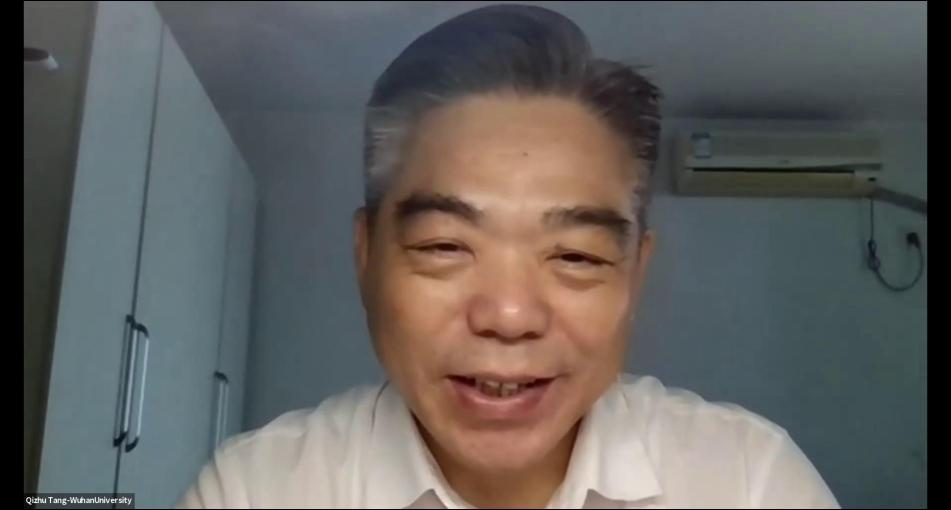
In his speech, Vice President Qizhu Tang pointed out that it is of great academic significance to hold an international symposium on the occasion of the 90th anniversary of the publication of Gödel's incompleteness theorems. On behalf of Wuhan University, Vice President Tang welcomed participants from different countries and wished all attendees will enjoy exchanging their ideas.
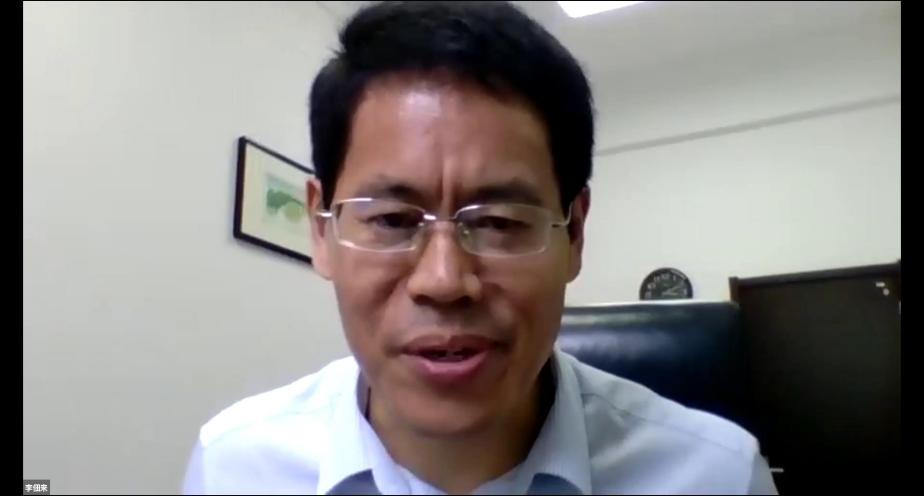
In his speech, Dean Dianlai Li pointed out that the incompleteness theorem has had a profound and vital impact on logic and philosophy. It is a great honour for the School of Philosophy of Wuhan University to host this workshop, and he wished the conference a great success.
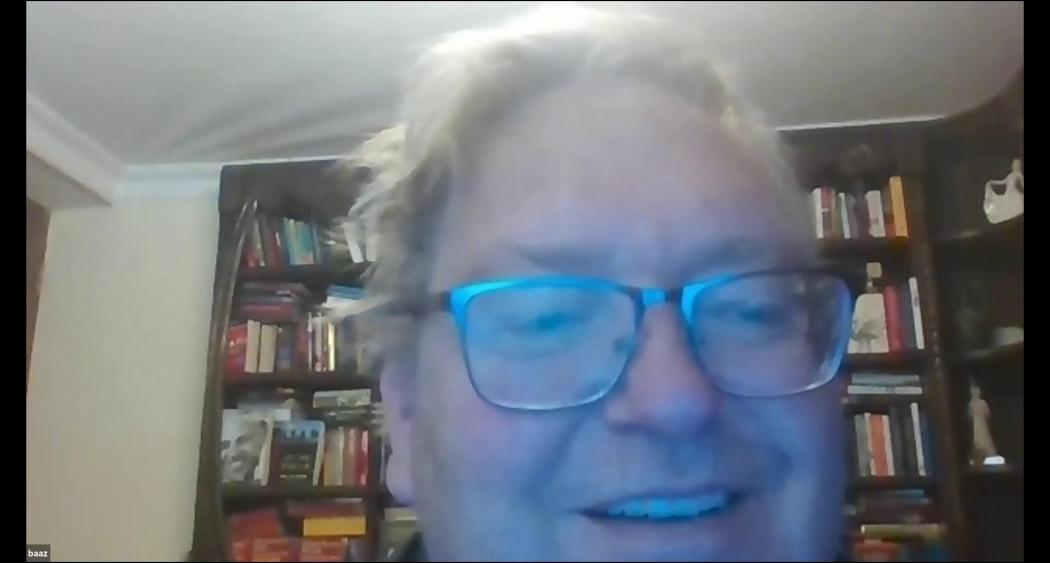
Professor Matthias Baaz summarized Gödel's academic contributions and the significance and impact of the incompleteness theorems. On behalf of the Kurt Gödel Society, he congratulated Wuhan University on hosting this workshop and wished the workshop a big success.
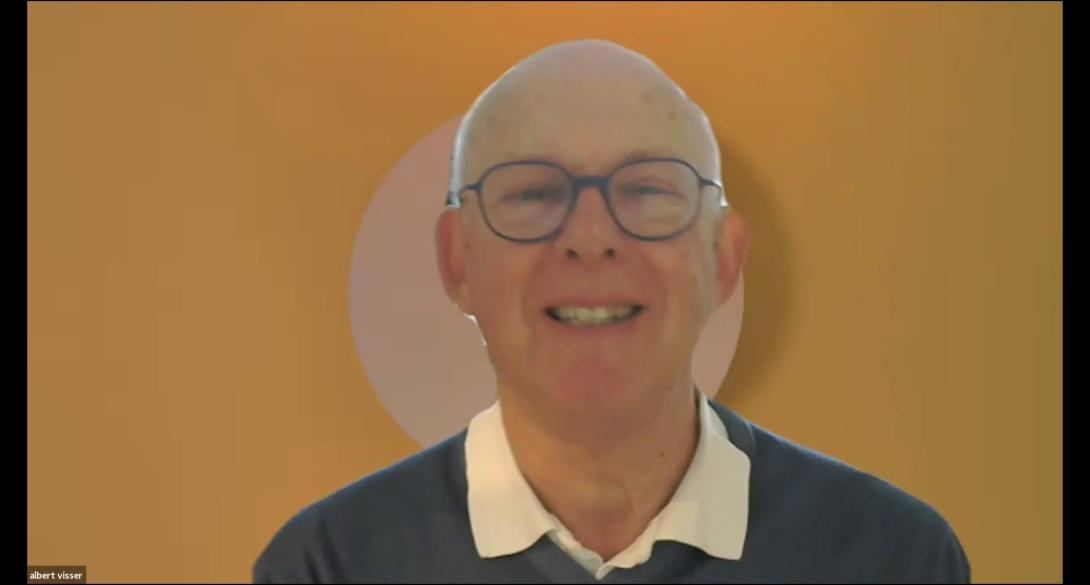
Prof. Albert Visser comprehensively and profoundly analyzed the main research directions and questions of the current research on the incompleteness theorems. He looks forward to wonderful discussions of these questions. Finally, the opening ceremony ended in an English introductory video about Wuhan University.
The content of this workshop covers nine themes about the research on incompleteness: different proofs of incompleteness, incompleteness and provability logic, incompleteness and self-reference, the limit of the applicability of the incompleteness theorems, incompleteness and computability theory, Hilbert program and incompleteness, incompleteness and philosophy of mathematics, the intensionality of incompleteness, and incompleteness in weak arithmetic. Each online talk is 1 hour and 15 minutes, including a one-hour for lecture and 15 minutes for Q&A exchanges. Attendees were active and provided excellent discussions.
The first session started at 3:30 pm on August 16th, including two talks, presided over by Prof. Albert Visser from the Royal Netherlands Academy of Humanities and Sciences.
The first lecture was given by professor Volker Halbach from the Department of Philosophy, University of Oxford, UK. He talked about self-reference and intensionality in metamathematics. He first discussed the philosophical importance of intensionality, then the intensionality in meta-mathematics and relations to other intensionalities in logic. He also discussed the sources of intensionality. Finally, he summarized the current research status and some unsolved problems.
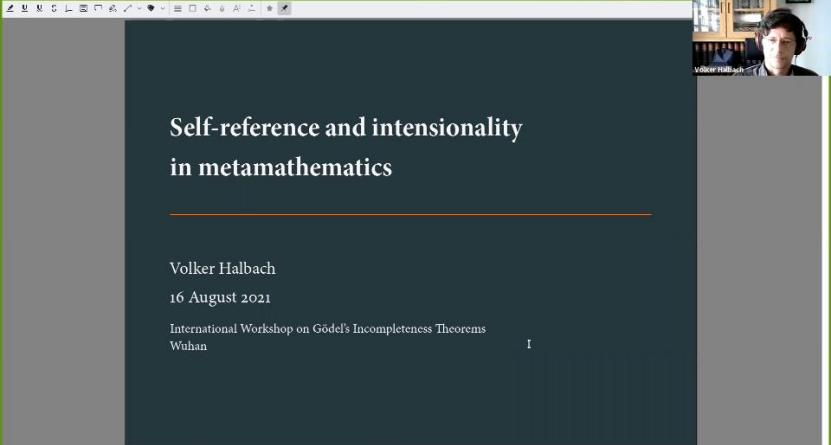
The second lecture was given by professor Stanislaw Krajewski from the Department of Philosophy, University of Warsaw, Poland. He talked about some consequences of the incompleteness theorems. He discussed several philosophical issues related to the incompleteness theorems, emphasizing whether humans' understanding of natural numbers can be compiled into computer programs. The speaker analyzed the anti-mechanism arguments based on the incompleteness theorems in detail. He concluded that these arguments do not imply that the human mind is not a machine only from Gödel's incompleteness theorems. Finally, he argued that we could not define the human understanding of natural numbers based on the incompleteness theorems.
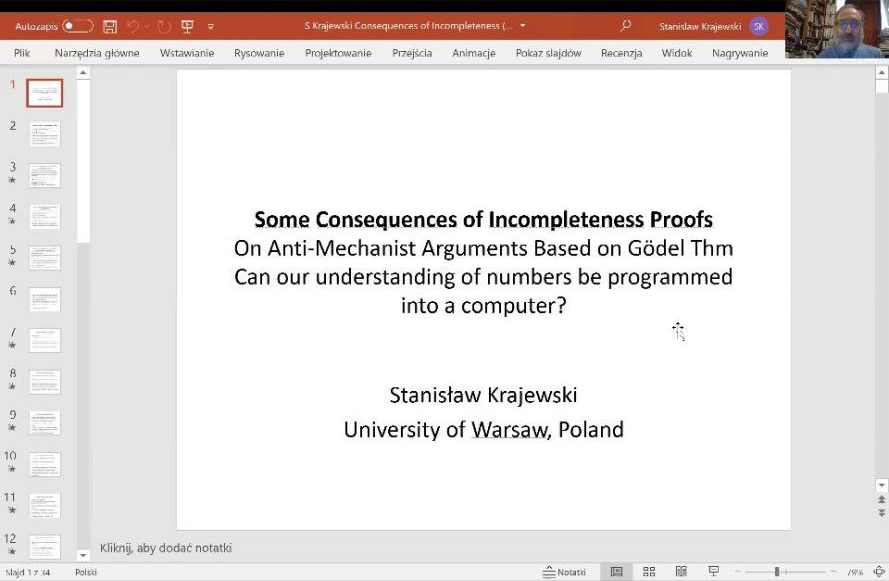
The second session started at 8 pm on August 16th and included two lectures, presided over by Professor Andreas Weiermann, from the Department of Mathematics, Ghent University, Belgium.
The third lecture was given by Professor Michael Rathjen, from the Department of Mathematics, University of Leeds, UK. He talked about Hilbert's program and (semi) Intuitionism. The talk pointed out that although Gödel's incompleteness theorems are often considered to falsify Hilbert's program, Hilbert's method of adding ideal elements to prove specific mathematical propositions was successfully applied in some situations. In particular, in the (semi)intuitionistic logic framework, the classical non-intuitive principle can be added to the theory without forfeiting conservativity for elementary statements. Professor Rathjen also proved the proof-theoretic strength of some constructive set theories under the framework of intuitionistic logic.
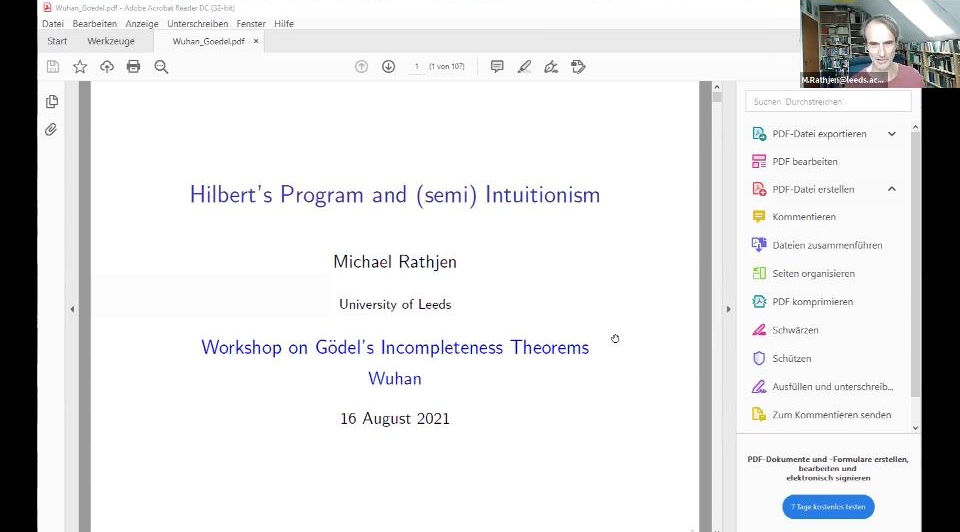
The fourth lecture was given by Professor Harvey Friedman, from the Department of Mathematics of Ohio State University. He is a Distinguished Professor of Mathematics, Philosophy, and Computer Science, the youngest professor of the Guinness World Records, also won the honorary title of "Top 100 American Scientists Under 40". He talked about aspects of incompleteness. He first discusses the different general forms of the first incompleteness theorem (G1). Afterwards, various forms of the second incompleteness theorem (G2) based on the concept of interpretation are discussed. Next, Professor Friedman gave a new proof of G2 based on explicitly remarkable sets, which cleanly separates the auxiliary construction from the direct verification. Finally, he discussed the most recent examples of Tangible Incompleteness from ZFC with various large cardinal hypotheses.
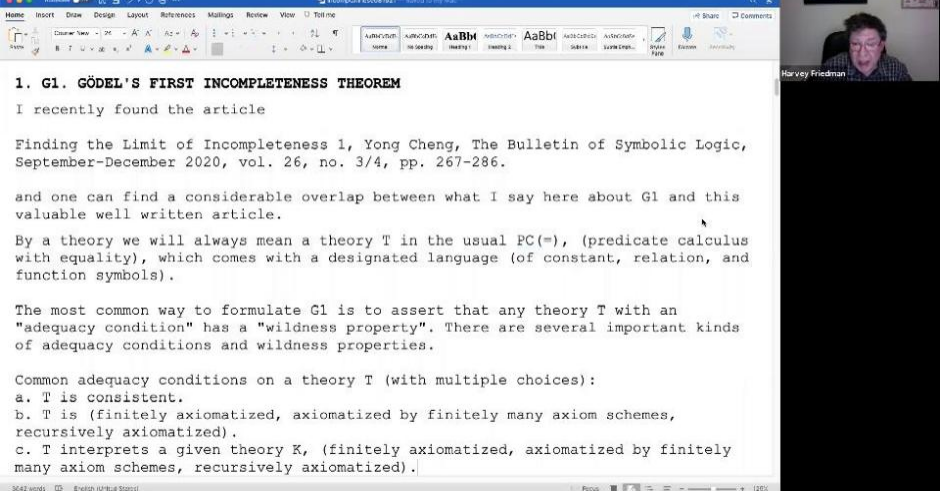
The third session of the workshop started at 9 am on August 17th and included two talks. The host, Albert Visser (Royal Dutch Academy of Art and Sciences), could not attend due to the time difference, and he introduced the two speakers Professor Juliet Floyd and Saul Aaron Kripke through video recording. This session was hosted by Sergei N. Artemov(Distinguished Professor of the City University of New York).
The fifth lecture was given by Professor Juliet Floyd, from the Department of Philosophy at Boston University. She talked about Truth in Early Wittgenstein and Gödel. The talk pointed out that the work of Gödel and early Wittgenstein was influenced to a certain extent by Russell's theory of truth. She introduced Russell's theory of truth and then discussed the views of Gödel and Wittgenstein on it. Professor Floyd analyzed the different understandings of the concept of truth between Gödel and Wittgenstein and emphasized that these different understandings are philosophically comparable.
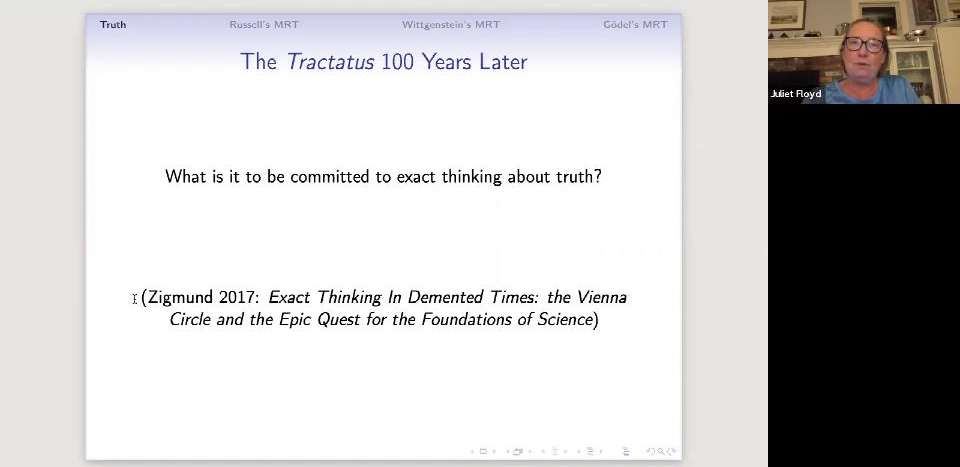
The sixth lecture was given by Professor Saul Aaron Kripke (Schock Prize winner, American Academy of Arts and Sciences, European Academy of Arts and Sciences, and Distinguished Philosophy Professor of the City University of New York) from the City University of New York. He talked about "A Model-Theoretic Approach to Gödel's Theorem". The talk pointed out that Gödel's famous incompleteness theorem is unusual in being a purely proof-theoretic argument. Usually, when one prove that a statement is unprovable from some axioms, one produces a model in which the statement is false. One version of Gödel's second incompleteness theorem was long known, that it is impossible to prove within Gödel-Bernays set theory that it had a well-founded model. It might be hard to do this for arithmetic, where nonstandard models are never well-ordered. In this talk, he showed that this difficulty could be overcome, yielding a model-theoretic version of Gödel's theorem.
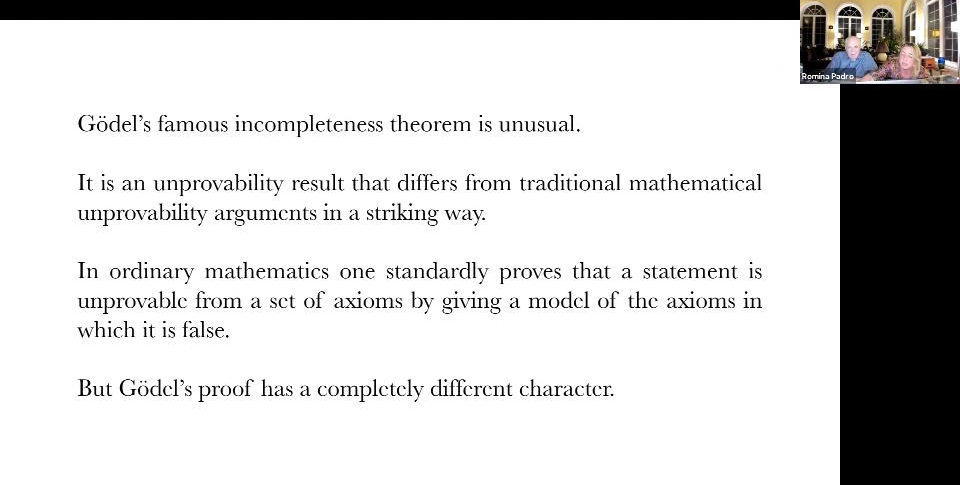
The fourth session of the workshop was held at 3:30 pm on August 17th and included three talks, chaired by Professor Yang Yue from the Department of Mathematics, National University of Singapore.
The seventh lecture was given by Professor Saeed Salehi from the Department of Mathematics, Tabriz University, Iran. The topic is "Some Fairies in the Incompleteness Wonderland". The landscape of incompleteness (if there is such a land) is indeed a wonderland, full of surprises, beauties, and fairies. Some fairies are the pretty proofs of the first incompleteness theorem given by Gödel (1931), Rosser (1936), Kleene (1936, 1950), Chaitin (1970), and Boolos (1989). In this talk, he studied some properties of these proofs, like their constructivity and independence (Rosser property), and examined if they deliver Gödel's second incompleteness theorem (G2) or could be derived from it.
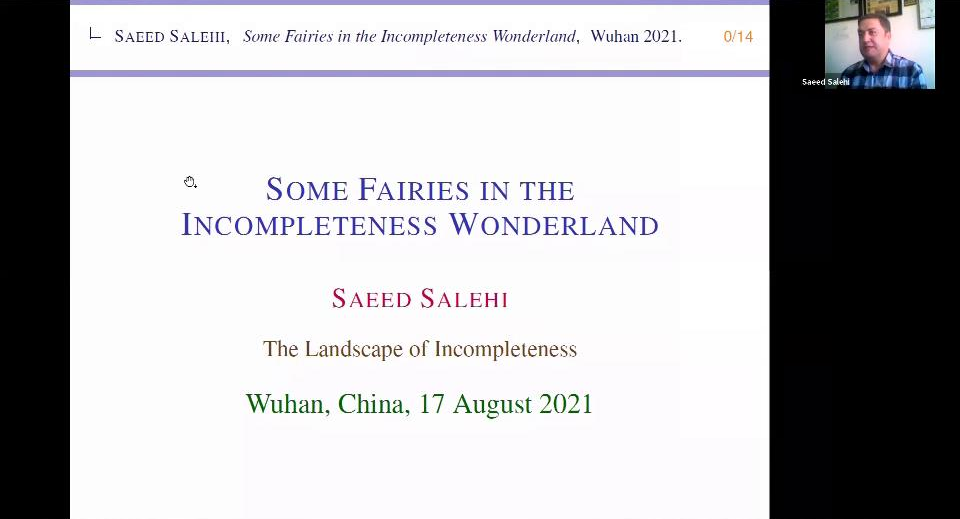
The eighth lecture was given by Lev D. Beklemishev, an Academician of the Russian Academy of Sciences. The topic is "Strictly positive provability logics: recent progress and open questions". The talk dealt with the fragment of propositional modal logic consisting of implications of formulas built up from the variables and the constant "true" by conjunction and diamonds only. We call such fragments strictly positive. Strictly positive logics recently attracted attention both in the description logic and in the provability logic communities for their combination of efficiency and sufficient expressivity. Moreover, strictly positive logics allow for alternative interpretations that are quite natural from a proof-theoretic point of view. He presented recent results and remaining open questions in this area.
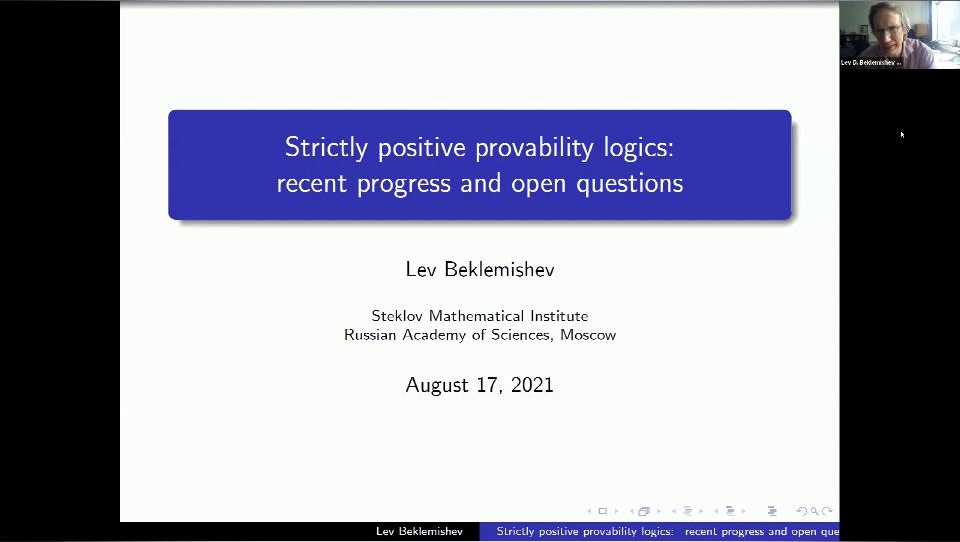
The ninth lecture was given by Professor Julia F. Knight from the Department of Mathematics of the University of Notre Dame (Charles L. Huisking Professor of Mathematics at the University of Notre Dame). The topic is “Completions of PA and ω-models of KP. The talk considered analogies between a computable binary branching tree whose paths represent the completions of first-order Peano Arithmetic and a computable infinitely branching tree whose paths represent the complete diagrams of ω-models of Kripke-Platek set theory. She also discussed what is computed by the paths through these trees. In both settings, there is self-awareness of the kind that Gödel used for his Incompleteness Theorems.
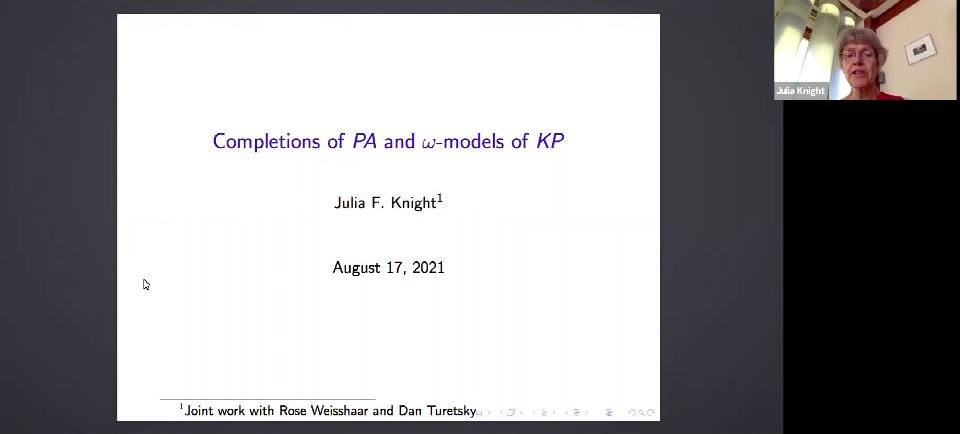
The fifth session of this workshop was held at 3:30 pm on August 18th, including two talks, chaired by Professor Andreas Weiermann, Department of Mathematics, Ghent University, Belgium.
The tenth lecture was given by Dr. Juan P. Aguilera, from the Department of Mathematics, Ghent University, Belgium. The topic is "The Pi^1_2 Consequences of a theory". The talk gave a categorical definition of the Pi^1_2-norm of a theory T, a specific well-foundedness preserving functor on the category of ordinals. This is an analogue of the Pi^1_2 ordinal for T for Pi^1_2 notions. He showed that for Pi^1_2-sound, recursively enumerable extensions of ACA_0, this norm is well defined and recursive and captures all the Pi^1_2 consequences of T.
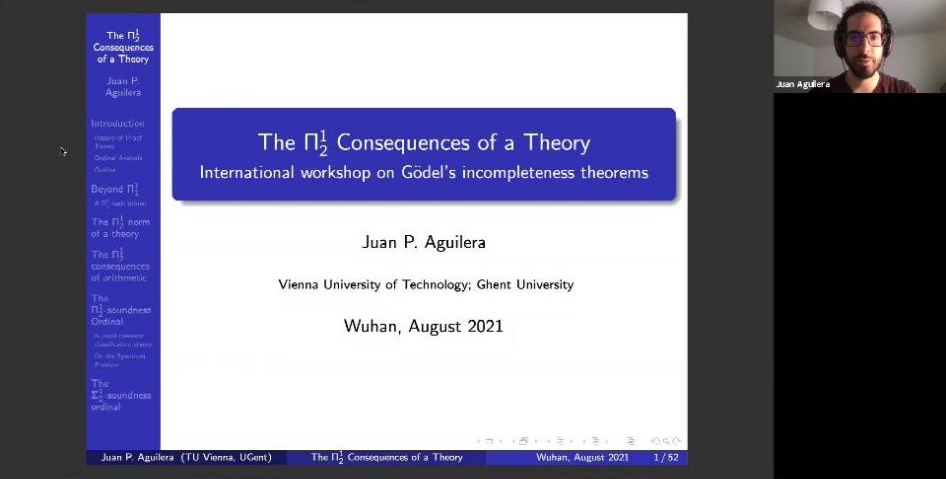
The eleventh lecture was given by Professor David Fernandez-Duque from the Department of Mathematics, Ghent University, Belgium. His topic is "When Ackermann meets Goodstein". The classical Goodstein process consists of writing a number in terms of the base-2 exponential, then iteratively raising the base and subtracting one. Similar processes can be defined by writing natural numbers in terms of other functions, such as the Ackermann function. In this talk, he discussed Ackermannian variants of the Goodstein process and showed how the proof-theoretic strength of termination varies wildly as we modify how numbers are represented.
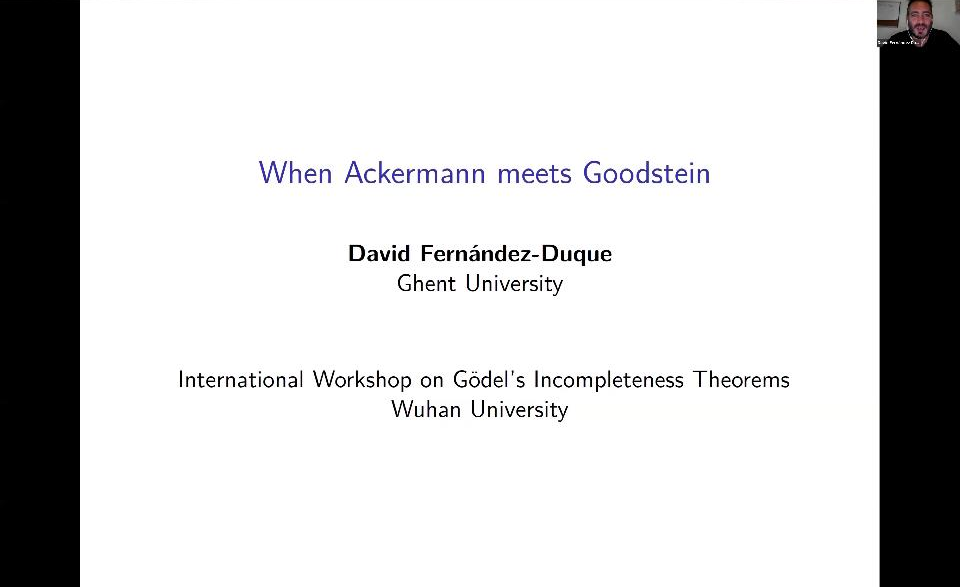
The sixth session of the workshop was held at 8 pm on August 18th, including three lectures, chaired by Professor Yong Cheng from the School of Philosophy of Wuhan University.
The twelfth lecture is given by Professor Wilfried Sieg (Academician of the American Academy of Arts and Sciences) from the Department of Philosophy of Carnegie Mellon University. He talked about "Gödel in AProS". He opened with the question: How to prove Gödel's incompleteness theorems in an automatic proof system. Professor Sieg proposed a new proof search system AProS, and studied how to give an abstract proof of the incompleteness theorem in AProS. The research showed that people could construct a clear formal proof of the incompleteness theorem and related theorems in the system AProS.
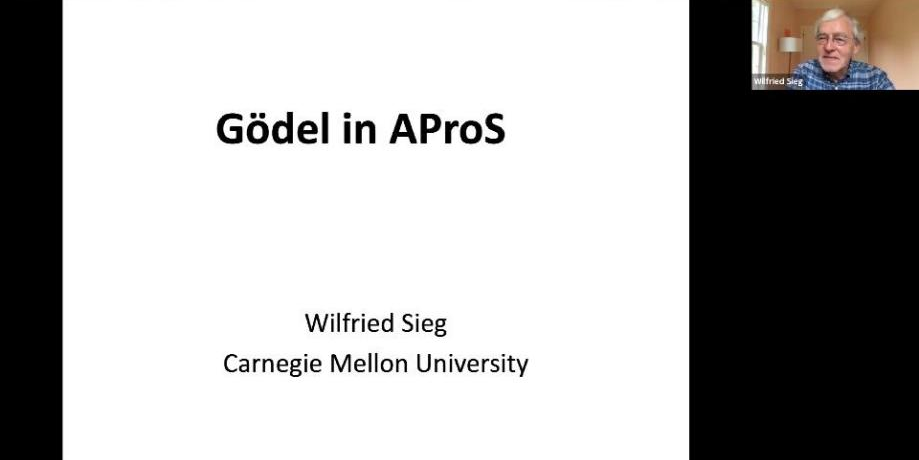
The thirteenth lecture, "On the hierarchy of natural theories", was given by Dr. James Walsh from Cornell University School of Philosophy. It is a well-known empirical phenomenon that natural axiomatic theories are pre-well ordered by consistency strength. However, without a precise mathematical definition of "natural", it is unclear how to study this phenomenon mathematically. James discussed some strategies for addressing this problem that has been developed recently. These strategies emphasize connections between reflection principles and ordinal analysis and draw on analogies with recursion theory.
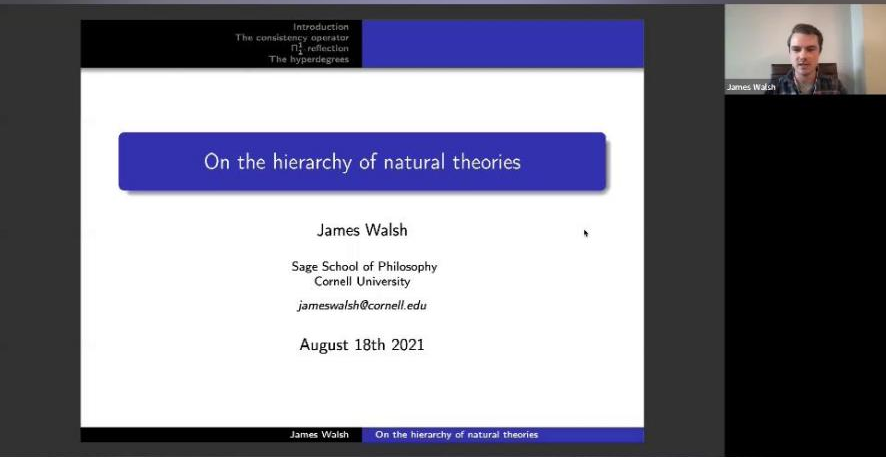
The fourteenth lecture, "Tight Theories", was given by Professor Ali Enayat from the Department of Philosophy, University of Gothenburg, Sweden. A first-order theory T is said to be *tight* if no two different deductively closed extensions of T (in the same language) are bi-interpretable. Albert Visser established the tightness of PA (Peano arithmetic) in his 2006 paper "Categories of theories and interpretations". The tightness of certain other foundational theories, including Z_2 (Second-order arithmetic), ZF (Zermelo-Fraenkel set theory), and KM (Kelley-Morse theory of classes), was established in her paper "Variations on a Visserian theme"; the same paper includes a conjecture that no deductively closed proper subtheory of PA, Z_2, ZF and KM is tight. In this talk, she presented recent results that provide partial evidence for the veracity of this conjecture.
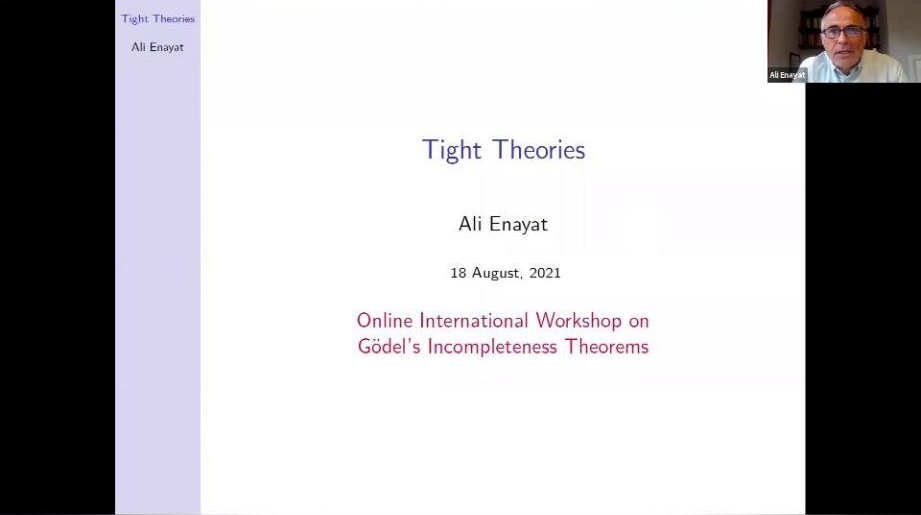
The seventh session of the workshop was held at 3:30 pm on August 19th, including two lectures chaired by Professor Yue Yang from the National University of Singapore.
The fifteenth lecture was given by Professor Taishi Kurahashi from the Institute of System Information, Kobe University, Japan. His topic is "Inclusions between quantified provability logics". Quantified provability logic QPL_Sigma(T) is known to be heavily dependent on the theory T and the Sigma_1 definition Sigma(v) of T. The talk investigates several consequences of inclusion relations between quantified provability logics and show that inclusion relations rarely hold. Moreover, Kurahashi gives a necessary and sufficient condition for the inclusion relation between quantified provability logics with respect to Sigma_1 arithmetical interpretations.
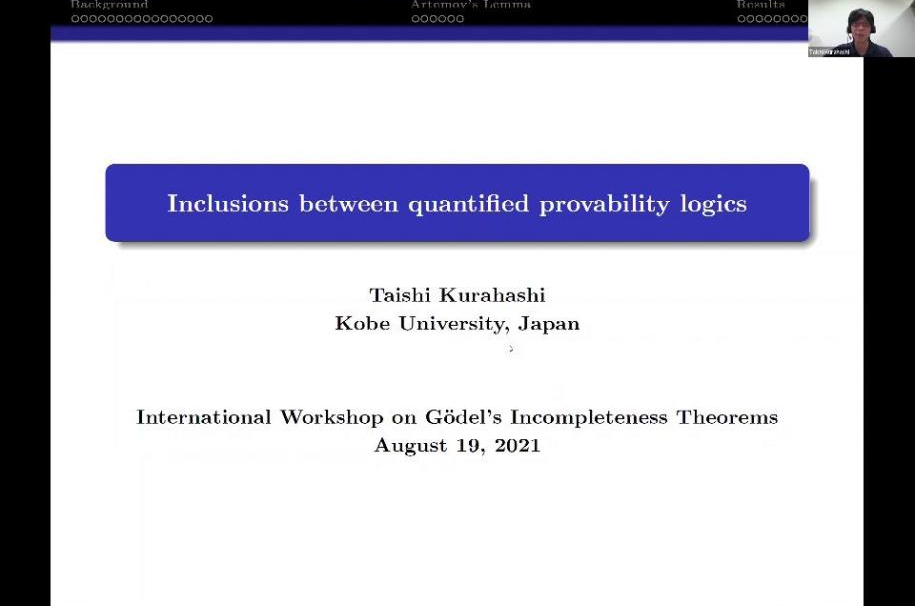
The sixteenth lecture was given by Dr. Balthasar Grabmayr, Department of Computer Science, Humboldt University, Germany, on "A Step Towards Absolute Versions of Metamathematical Results". He argued that there is a gap between the mathematical expression of the second incompleteness theorem (G2) and the informal version used in philosophical discussions. To fill this gap, we need to study the conditions for the establishment of G2. He analyzed the relationship between whether G2 is established and the choice of grammar system and coding method, given definitions of acceptable grammar systems and acceptable coding methods and proves that G2 is valid under acceptable grammatical systems and coding methods. Still, under incompatible grammatical systems and coding methods, G2 may not be valid.
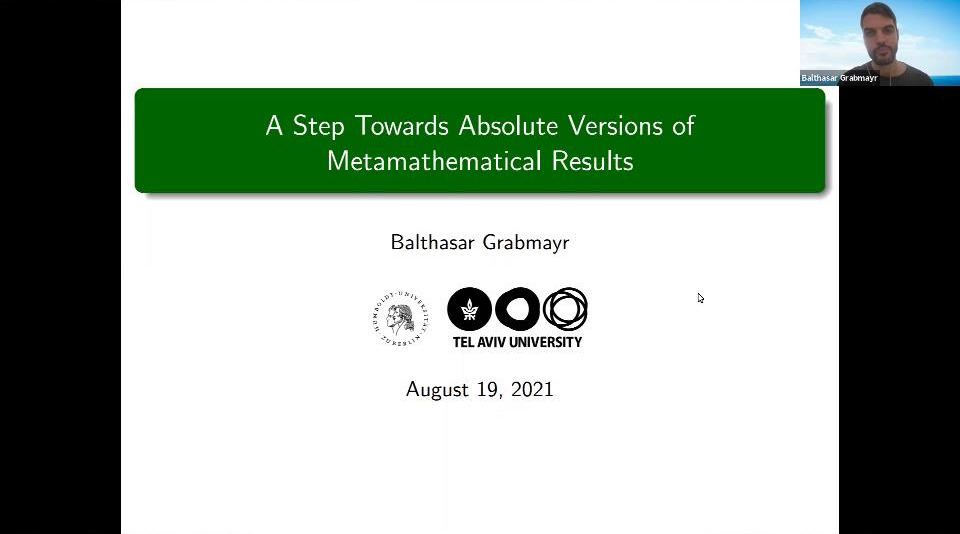
The eighth session of the seminar was held at 8 pm on August 19th, including three lectures, chaired by Professor Andreas Weiermann, Department of Mathematics, Ghent University, Belgium.
The seventeenth lecture was given by Dr. Anton Freund from the Department of Mathematics, Darmstadt University of Technology, Germany. He talked about "Independence without computational strength". In the spirit of Hilbert's program, we can ask whether all universal statements about the natural numbers are decided by Peano arithmetic. While Gödel's incompleteness theorems provide a negative answer, mathematical examples are scarce in the purely universal realm, despite the work of H. Friedman and S. Shelah. Anton represented a related result: Kruskal's theorem can be cast into an axiom scheme that transcends Peano arithmetic but does not add provably total functions. The only known independence proof is a reduction to Gödel's theorem. In this respect, the new axioms behave like universal statements (they are in fact Sigma_2) and are very different from other examples of mathematical independence.
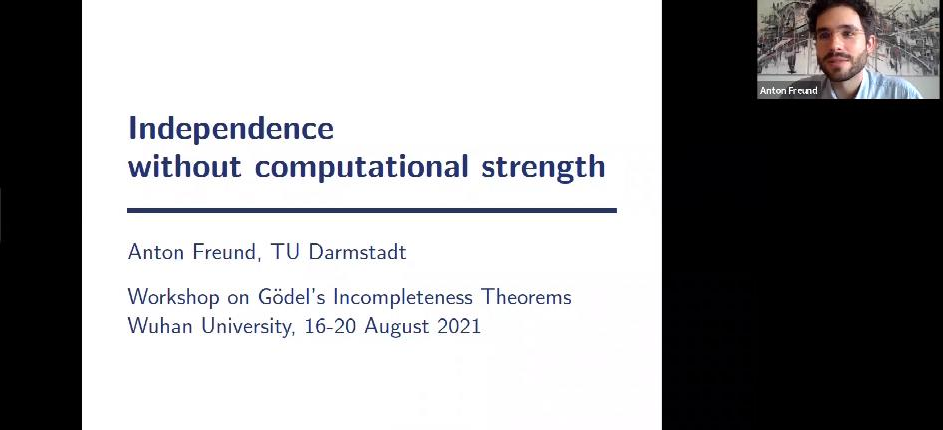
The eighteenth lecture was given by Professor Matthias Baaz from the Department of Mathematics, Vienna University of Technology, Austria. The topic is "Incompleteness and attempted proofs of consistency". In this lecture, he analyzed the origins of the completeness and consistency problem and also the technical background, why the Hilbert school was convinced that a positive solution is possible. He described attempted proofs of consistency of the Hilbert school (especially using epsilon calculus and Herbrand's theorem) and describe how they provide valuable information if seen from another point of view.
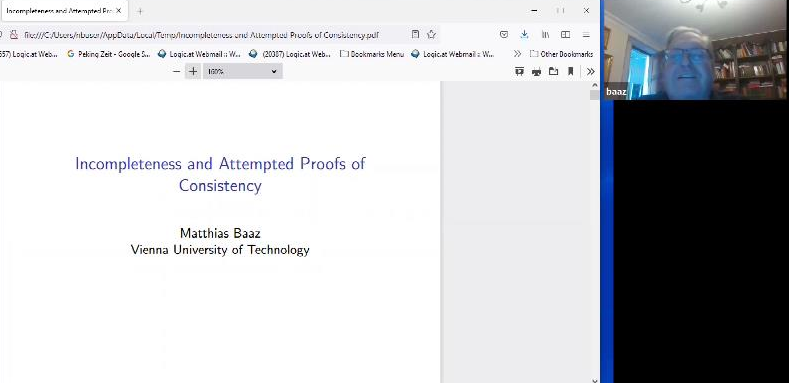
The nineteenth lecture on "Arithmetization-free Gödel's Second Incompleteness Theorem for finitely axiomatizable theories" was given by Dr. Fedor Pakhomov, Department of Mathematics, Ghent University, Belgium. The motivation of this research is to find a general abstract form of the second incompleteness theorem. Visser proved that no consistent sequential finite axiomatizable theory T could explain its predicative comprehension PC(T). This provides an arithmetization-free version of the Second Incompleteness Theorem. In the talk, Fedor showed that, in fact, this result holds in far greater generality: no finitely axiomatizable theory T can one-dimensionally interpret its predicative comprehension PC(T).
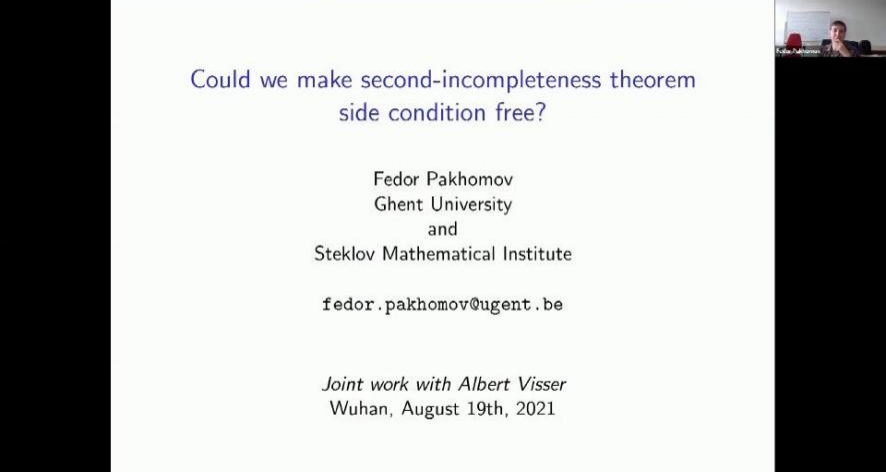
The ninth session of the seminar was held at 3:30 pm on August 20th, including two lectures, chaired by Professor Yong Cheng from the School of Philosophy of Wuhan University.
The twentieth lecture on "On two topics dear to Kurt Gödel" was given by Dr. Sam Sanders from the Philosophy Department of Ruhr University Bochum, Germany. He discussed two topics in mathematical logic in the spirit of Gödel's celebrated legacy. Firstly, was constructing models of higher-order arithmetic in which the reals numbers form countable sets, i.e. there is an injection/bijection to the natural numbers. Secondly, he discussed the implication for the foundations of mathematics and physics.
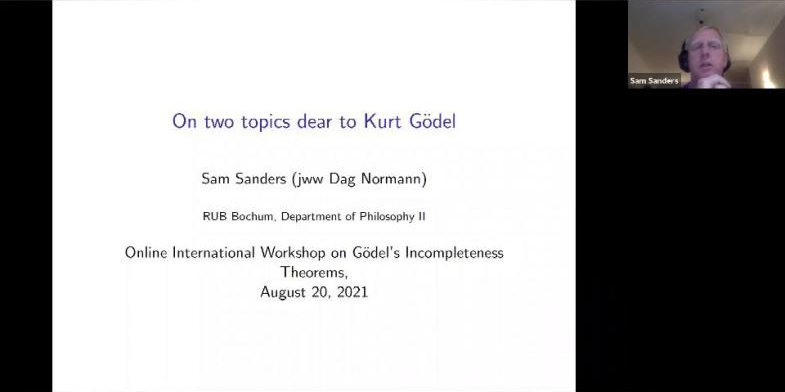
The twenty-first lecture was given by Professor Juliette C. Kennedy, from the Department of Mathematics and Statistics, University of Helsinki, Finland. The topic is "Gödel and the Scope Problem: From Incompleteness to Extended Constructibility". Gödel once proposed whether we can develop an absolute definability concept. In this talk, Juliette offered an implementation of Gödel's suggestion for definability in the direction of extended constructibility. This involved considering Gödel's constructible hierarchy L, which is built over first-order logic, and asking if we vary the underlying logic, i.e. if we replace the first-order logic in the construction of L by another logic, do we get L back?
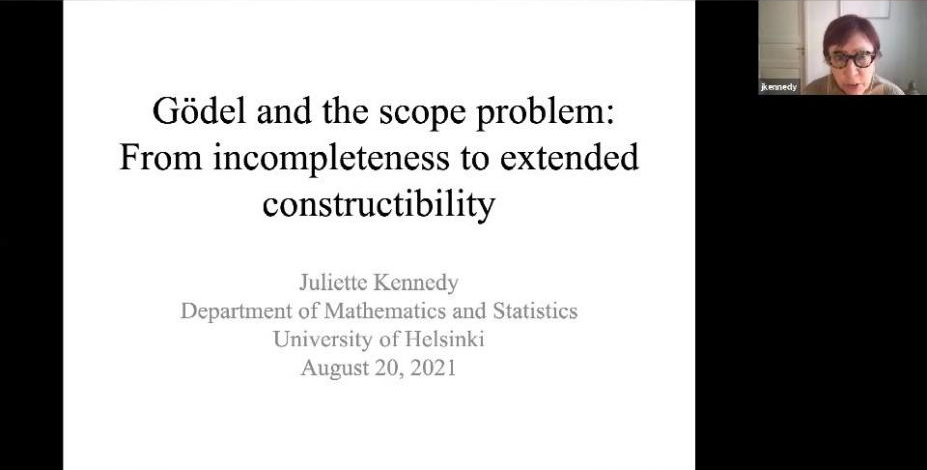
The last session of the seminar was held at 8 pm on August 20th, containing three talks, chaired by Prof. Albert Visser (Academician of the Royal Netherlands Academy of Humanities and Sciences).
The twenty-second lecture, on "Minimal Logics for Incompleteness", was given by Professor Joost J. Joosten from the Department of Philosophy, University of Barcelona, Spain. In this talk, he started out in the propositional realm and discussed various different approaches to take when describing formal provability, its generalizations and its limitations. After that, he mentioned that moving from a full logic to a closed fragment or to a strictly positive fragment supposes a drop in complexity for the corresponding decision problems, for example, from PSPACE to PTIME. Never however has this decrease been so drastic as in the case of Quantified Provability Logic where one goes from Pi_2 complete to decidable. He discussed the main dynamics behind this decrease.
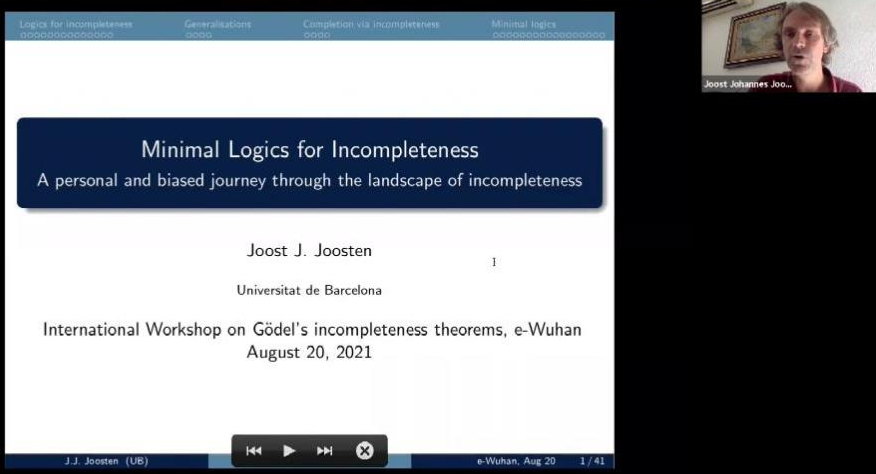
The twenty-third lecture was given by Professor Emil Jerabek of the Czech Academy of Sciences on "Hereditarily bounded sets". Vaught's set theory VS is one of the weakest and simplest essentially undecidable theories. In contrast, the finite fragments VS_k of VS are not essentially decidable. However, known proofs of this fact are rather undirect: each V Sk is interpretable in any theory with a pairing function, and there exist decidable theories with pairing. The decidable extensions of VS_k obtained in this way are quite unnatural, e.g., they are incompatible with extensionality. In this talk, the speaker showed that Th(Hk) is decidable, and can be presented by a transparent explicit axiom set. Emil also characterized elementary equivalence of tuples in models of Th(Hk), show that it enjoys a form of quantifier elimination, and determines its computational complexity.
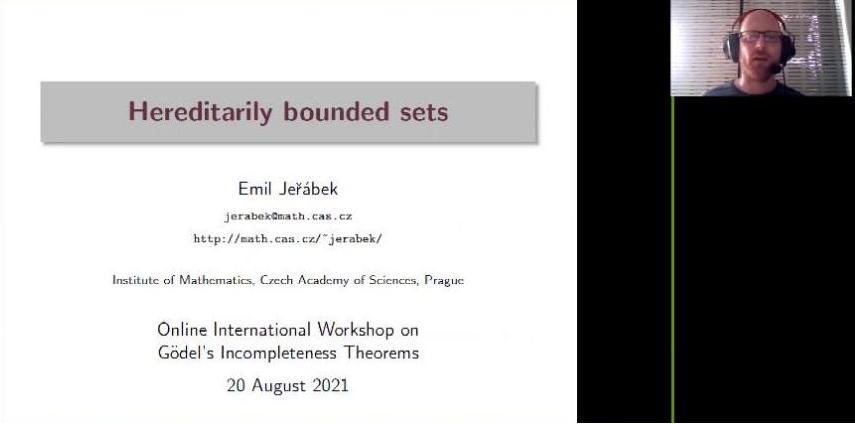
The last talk was given by Professor Pavel Pudlak of the Czech Academy of Sciences on "Incompleteness theorems for weak theories of arithmetic and some stronger versions of the incompleteness theorem". During the talk, the speaker first discussed some stronger versions of (G2), then discussed G2 for the weakest reasonable arithmetical theory. To do that, he proved a stronger version of the incompleteness theorem that asserts that for any definable initial segment of integers I without the largest element, it is consistent to assume that the proof of contradiction is in I. Finally, he discussed some other applications of this strengthening.
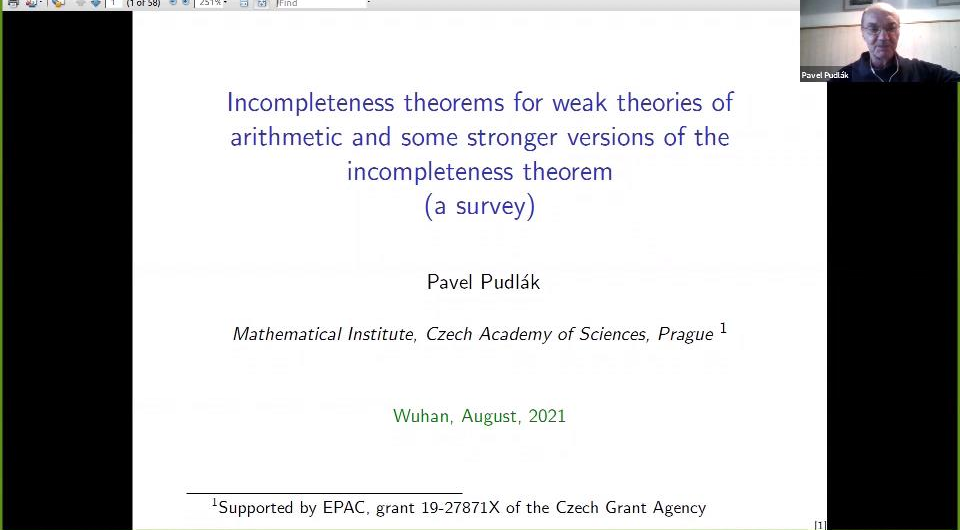
At midnight on August 20th, the organizing committee chair, Professor Yong Cheng from the School of Philosophy of Wuhan University, reviewed and summarized the workshop, and thanked all speakers for offering such wonderful talks and discussions. So far, the 5-day International workshop on Gödel's Incompleteness Theorems had come to a successful conclusion.
(By Jinghui Tao)



